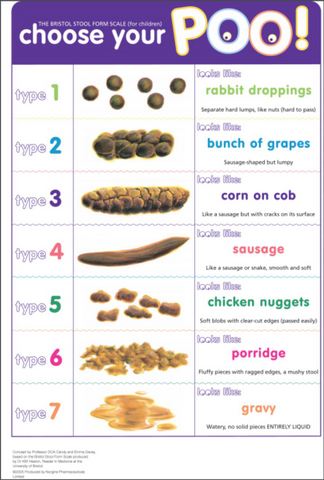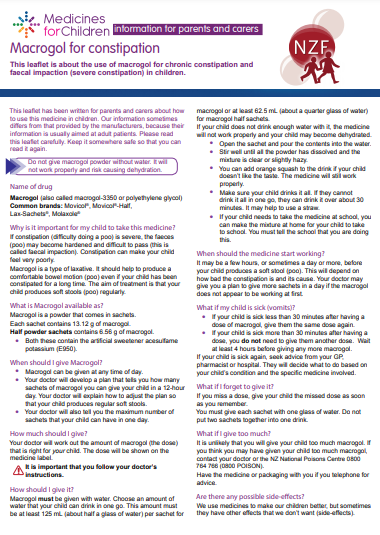Laxatives are medicines that help your body get rid of poo/tūtae. They are an essential part of the treatment of long-lasting constipation and soiling. Most are available to buy at a pharmacy but it may be better to go to your family doctor first. Your doctor can give you advice about the best laxative for your child and how much to give them. Your doctor can also give you a prescription, which usually means you won't have to pay for the laxative. Read more about constipation in children.
We're aware of a problem when trying to use Zero Data to link to Healthify. Zero Data is managed by Health NZ and we are working with them to get this fixed.
Laxatives for children
Key points about laxatives for children
- Laxatives are medicines that help your body to get rid of poo. They are safe and don't make your body ‘lazy’ or unable to do a poo naturally.
- Generally your child should have 1 soft-formed poo/tūtae every day that is not painful or difficult to pass.
- Lactulose and macrogol are the most common and most effective medicines for children with constipation.
- Children with hard or impacted poo sometimes need a bowel washout.
See also our page on laxatives for adults.

There are 3 ways laxatives for childhood constipation work:
- Some soften the hard poo and make it easier to do (poo softeners).
- Some help your bowel push the poo out (stimulants or emptiers).
- Some wash your bowel out completely.
Lactulose and macrogol are the most common and effective medicines for tamariki with constipation.
Often children dislike the taste of medicine. You can try to make the medicine taste better by mixing it with milk or juice. Otherwise you can ask your doctor or nurse about an alternative laxative. Incentives such as star charts can be a good way of encouraging your child to take medicine regularly.
Lactulose – a poo softener
Lactulose is a liquid. It is the most common medicine for constipation in children. It may taste better if you chill it or mix it with some juice or milk. Make sure your child brushes their teeth after taking lactulose. Read more about lactulose for constipation.(external link)
Macrogol – a poo softener
Macrogol is a powder you mix with liquid. It should help to produce a comfortable bowel motion (poo/tūtae). See macrogol for constipation.(external link)
Poloxamer (also called Coloxyl drops) – a poo softener
Poloxamer is available as drops. The drops are useful for children under 3 years of age.
Docusate (also called Coloxyl tablets) – a poo softener
Docusate is available as tablets. It is useful for children older than 2 years. To make is easier for your child to swallow, the tablets can be halved or crushed.
Your child should take laxatives until they have developed a normal habit of pooing regularly. Ideally, your child should have 1 soft-formed poo that is not painful to do, every day. Laxatives are needed until their body can manage this without help. Ideally laxatives should be used for at least 3 months, however many children need laxatives for over 6 months, up to years – especially if they have had constipation for a long time.
Laxatives work best when taken every day. You may need to adjust the dose over time, but it is important to continue the treatment as advised. Laxatives do not make the bowel lazy and they are not addictive. Stopping laxatives too soon can lead to ongoing constipation coming back.
A bowel clean-out or washout is done when poos have built up in your lower bowel over time. This is also called disimpaction. A bowel clean-out is done to clear your bowel of any poo. It is done by giving increasing doses of a stool softener, such as macrogol, or with the use of sodium picosulphate.
A bowel clean-out can be done at home, under the supervision and guidance of your doctor. You will be asked to observe your child closely and ensure that they take the medicine correctly. Your child will need to stay home from school.
In the first instance the medicine may cause your child to pass a lot of watery stools (poo) and it may make any soiling worse. The medicine will start to dissolve the hard poo and you should notice harder poo mixed with the watery poo. The medicine must be continued until your child is no longer passing any hard-formed poo and the poo has become consistently watery. This process may take up to 2 weeks or longer.
Following a successful bowel washout, it is important that your child uses a long-term laxative to prevent constipation.
Macrogol
Macrogol is a powder you mix with liquid. It is particularly good for children with very hard or impacted poo. If you use this as a bowel washout, make sure to only do this after talking to your doctor and following their instructions. See macrogol for constipation.(external link)
Sodium picosulphate
Sodium picosulphate is used for bowel washouts when macrogol does not work adequately. You should only give this to your child if your doctor has advised you to use this. It is useful for children with hard or impacted poo. See sodium picosulfate for constipation.(external link)
Bristol stool chart for children(external link) For children and parents
Constipation in children – macrogol for constipation [PDF, 266 KB] NZ Formulary for Children, 2014
References
- Constipation in children(external link) Auckland Regional HealthPathways, NZ, 2021
Brochures

For children and parents

NZ Formulary for Children, 2014

Medicines and side effects
Healthify He Puna Waiora, NZ, 2024
Credits: Healthify He Puna Waiora editorial team. Healthify is brought to you by Health Navigator Charitable Trust.
Reviewed by: Dr Sara Jayne Pietersen, FRNZCGP, Auckland
Last reviewed:
Page last updated:





